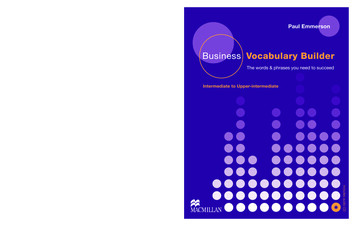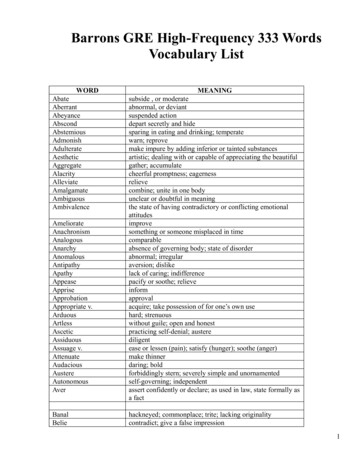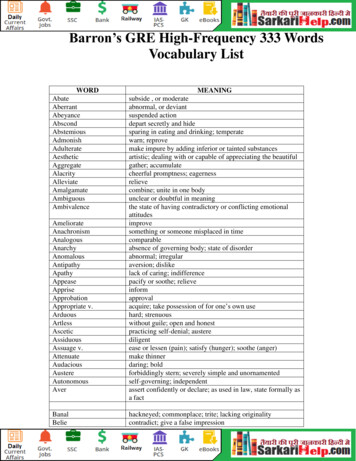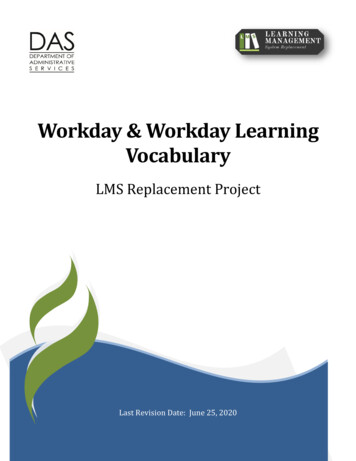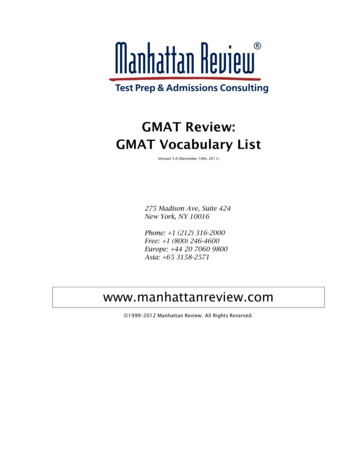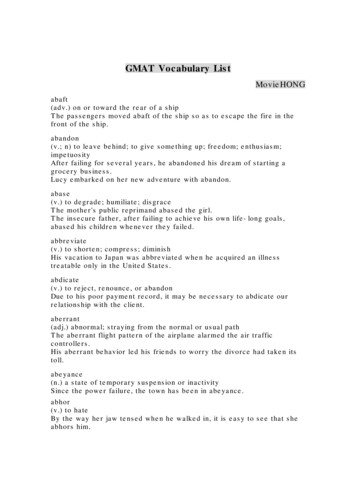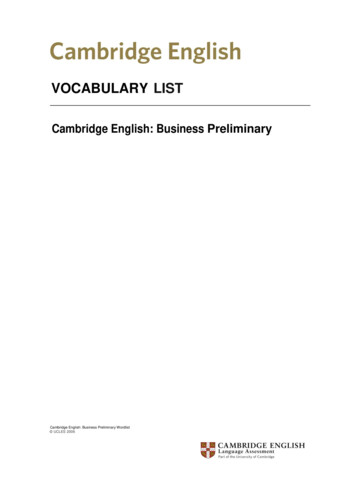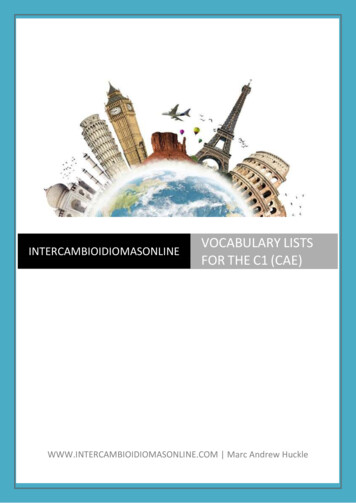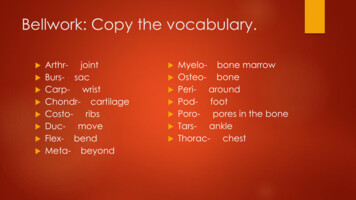
Transcription
BusinessVocabulary inAdvancedBill MascullШ CAMBRIDGEUNIVERSITY PRESS
ContentsINTRODUCTIONQUALITYlll What is quality?THE HUMAN DIMENSION28A Defining quality В Quality in manufacturing CQuality in servicesWorld of work10A My work is so rewarding В I like theteam work C I want to make a contributionManagement styles1A Standards and cenification В ISO 900014A Total quality management В KaizenC Just-in-time productionA Motivation 1 В Motivation 2 C TheoryX and Theory YManagement styles2TQM and JITA Hygiene factors В Motivator factors CEmpowermentU Employment andemployabilityQuality and peopleand inflexibility303234A Investors in people В The EFQM Excellence Model163 The management of change 36A Business process re-engineering В The benefits ofBPRA Outsourcing В EmployabilityC Ereelancers and portfolio workersFlexibilityQuality standards1218A Ways of working В Job flexibility C JobprotectionWork-lifebalance20A StressВ The causes of stress C Quality of life9 ManagingtalentStriving for perfection2238A Benchmarking and best practice В Six sigma qualityA Core competents В Creatives and suitsU Team building24A Teams В Team players C Stages ofteam lifeCOMPETITIVE STRATEGYlit Strategic thinking40A StrategyВ Companies and marketsCompetition42A CompetitorsВ ‘Competing’ and ‘competitive’Companies and their industries44A Competitive forces В SWOT analysis C Be good atsomethingThe right skillsA Hard and soft skills ВEmotional intelligenceBusiness Vocabulary in Use (advanced)26
llil Key strategic issues46A Industries and their players В Mergers andacquisitions (M&cA) C Make or buy?IT AND ITS USESm The IT revolution64A Broadband Internet В Mobile Internet CMoore’s LawЯП Innovation48A Innovation and the development process В Pioneersand followers C Shakeout and consolidationyiil Internet security66A Attack and defence В CybercrimeC Privacy and confidentialityЩ E-commerce: after boomand bustPreparing for the future 50A Scenario planning В Futurology C Risk management68A Old economy, new economy В B2C C B2BKnowledgemanagement70A Sharing knowledge В The learningorganizationICM IntellectualMARKETINGproperty72A Copyright infringement В Technicalprotection C Legal protectionThe four Ps and thefour Cs52A The four Ps В The four Csfff Customer satisfaction54A The customer В Customer delight C CustomerdissatisfactionKnowing your customers156A Data and databases В Data miningC Customer relationship managementm Knowing your customers258A SegmentationВ Customer groups: demographic and behaviouralsegmentation C Customer groups: lifestyle andpsychographic segmentationBrands and branding60A Brand equityВ Brand positioning and differentiation C BrandstretchingGlobal brandsCOMPANY FINANCEicfcl Measuring performanceCD Profit and loss account6276A Accruals accounting В Profit and loss CEarningsiCM Balance sheet 1A Steps abroad 1 В Steps abroad 2 C Think global, actlocal74A Financial reporting В The financial yearC Shareholders, bondholders and lenders78A Assets В DepreciationBalance sheet 2A Liabilities В Shareholders’ equityBusiness Vocabulary in Use (advanced)80
Cashflow statement82A Cash inflows and outflows В Typesof cashflowinvestment ratiosA Return on assets ВTHE GLOBAL ECONOMYEiri Global forces84Return on equity CLeverageGlobalizing trendsInvestment and debt86TradeInternational aid88104A Dismantling the barriers В Protectedindustries C Fair tradeQ) Accounting standardsA Audits and their transparency ВInternational standards102A Direct investment В BorrowingC Word combinations with ‘debt’Shareholder valueA YieldВ Price/earnings ratio C Maximizingshareholder value100A Paths to prosperity В GDPandGNI C106A Humanitarian aid В Development aidC The aims of aidSustainable development108A Climate change В Sustainability CThe triple bottom lineCORPORATE RESPONSIBILITYEthics and business90A Hthical behaviour В Accountabilityand transparency C Corporate socialresponsibilitym Social reportingA Social performance audits В Wordcombinations with ‘social’C Labour standardsEM Green issues92Index94A Imvironmental pollution ВRecyclingC Word combinations with ‘environmental’ DSustainabilirvCorporate governance96A Board organization ВSeparation of roles CRewards for success(and failure)m Ethical investmentA Controversial products ВSocially-responsible investmentBusiness Vocabulary in Use (advanced)Answer98keyno124
Cambridge International CorpusIn writing this book, extensive use has been made of business-related material from the CambridgeInternational Corpus: business articles from the British and American press.The corpus has provided valuable information on the typical patterns of business English usage,and this has been used in compiling the language presentation material and in many of theexercises.The Cambridge International Corpus is a vast database of over 700 million words of real Englishtaken from books, newspapers, advertising, letters and emails, websites, conversations andspeeches, radio and television. The Corpus helps us to get a representative picture of how English is used, both in writing andin speech It is constantly being updated so we are able to include new words in our books as soon as theyappear. It contains both British and American English, which means we can analyse the differences andproduce accurate materials based on either variety of English. It is ‘real’ English so we can ensure that examples in our books are natural and realistic.Cambridge Business CorpusThe Cambridge Business Corpus, which is part of the Cambridge International Corpus,contains business articles from the British and American press, business books, financial andlegal documents, company reports, professional and commercial texts, government reportsand product descriptions.More choice from the world’s bestsellers v faiUseAdvancedGrammarin Use4U h»elMcCarthyr«lkitvODeily. Visit our dictionary ulary in Use (advanced)
IntroductionWho is this book for?Business Vocabulary in Use Advanced builds on the success of Business Vocabulary in Use. It isdesigned to help upper-intermediate and advanced learners of business English improve their businessvocabulary. It is for people studying English before they start work and for those already working whoneed English in their job.The emphasis is on language related to today’s important, and sometimes controversial, businessissues.You can use the book on your own for self-study, or with a teacher in the classroom, one- to-one or ingroups.How is the book organized?The book contains 50 two-page thematic units, in eight key business areas.The left-hand page of each unit presents and explains new words and expressions, and the right-handpage allows you to check and develop your understanding of them and how they are used through aseries of exercises.There is cross-referencing between units to show connections between uses of the same word orsimilar words used in different contexts.There is an answer key at the back of the book. Most of the exercises have questions with only onecorrect answer. But some of the e.xercises, including the Over to you activities at the end of each unit(see below), are designed for discussion and/or writing about yourself and your own organization orone you would like to work for.Where appropriate, references at the bottom of left-hand pages give the sources (books and websites)for the ideas under discussion.There is also an index. This lists all the new words and phrases introduced in the book and gives theunit numbers where they appear. The index also tells you how the words and expressions arepronounced.The left-hand pageThis page introduces the new vocabulary and expressions for each thematic area. The presentation isdivided into a number of sections indicated by letters: A, B, C, with simple, clear titles.As well as explanations of vocabulary, there is information about: typical word combinations. the grammar associated with particular vocabulary, for example the verbs that are used withparticular nouns.There are also notes on tricky language points, such as countable and uncountable nouns, and thedifferences between British and American English.Business Vocabulary in Use (advanced)
The right-hand pageThe exercises on the right-hand page give practice in using the new vocabulary and expressionspresented on the left-hand page. Sometimes the exercises concentrate on using the words andexpressions presented on the left-hand page in context. Other exercises practise the grammaticalforms of items from the left-hand page. Some units contain tables to complete, or crosswords.'Over to you' activitiesAn important feature of Business Vocabulary in Use Advanced is the Over to you activity at theend of each unit, which caters for learners who are in work as well as those who are not. The Overto you activities give you the chance to put into practice the words and expressions in the unit inrelation to your own professional situation, studies or opinions.Self-study learners can do this as a written activity.In the classroom, the Over to you activities can be used as the basis for discussion with the wholeclass, or in small groups with a spokesperson for each group summarizing the discussion and itsoutcome for the class. The teacher can then get learners to look again at the words andexpressions that have caused difficulty. Learners can follow up by using the Over to you as awritten activity, for example as homework.How to use the book for self-studyFind the topic you are looking for by referring to the contents page or the index. Read through theexplanations on the left-hand page of the unit. Do the exercises on the right- hand page. Checkyour answers in the key. If you have made some mistakes, go back and look at the explanationsand exercise again. Note down important words and expressions in your notebook.How to use the book in the classroomTeachers can choose units that relate to learners’ particular needs and interests, for example areasthey have covered in course books, or that have come up in other activities. Alternatively, lessonscan contain a regular vocabulary slot, where learners look systematically at the vocabulary ofparticular thematic or skills areas.Learners can work on the units in pairs, with the teacher going round the class assisting andadvising. Teachers should get learners to think about the logical process of the exercises, pointingout why one answer is possible and others are not.We hope you enjoy using this book.Business Vocabulary in Use (advanced)
World of workMy work is so rewarding‘I work in advertising. I love my work, which is really rewarding and stimulating. Originality andcreativity are very important in this industry, of course.No two days are the same in my job; 1 could be contacting film companies for new advertisingcampaigns one day and giving client presentations the next. 1 like the client contact and I am verymuch hands-on - being involved with the productive work of the agency rather than managing it.When 1 joined the agency, 1 hit it off with my colleagues immediately and I still get on well withthem. There’s a very good rapport between us.’I like the team work‘I’m an aircraft engineer. I work on the research and development of new aircraft. I love puttingideas into practice. I like working on my own, but it’s also great being part of a team. I like theteam work and the sense of achievement when we do something new. And of course, the planeswe produce are very beautiful.Is there anything I don’t like? I dislike days when I’m chained to a desk. I don’t like admin andpaperwork - sometimes I feel I’m snowed under with it. And in a large organization like ours,there can be a lot of red tape and bureaucracy - rigid procedures that can slow things down.’I want to make a contribution‘I’m a secondary school teacher. It’s a low-paid job but I want to help people and make acontribution to society. That’s what gives me motivation. My job gives me a lot of satisfaction.The work can be stretching, taking me to the limits of my skills and knowledge. But it’s great tosee kids developing and learning. Of course, they can be very difficult and demanding, butsometimes we even get recognition from parents that we are doing a good job! But I don’t likeunnecessary interference - I don’t like people breathing down my neck.’10Business Vocabulary in Use (advanced)
1.1Complete the sentences with expressions from A opposite.1 Work that is interesting and exciting is .and .23If you have a good working relationship with your colleagues, you . well with them.4If you do the actual work of the organization rather than being a manager, you are5If you want to say that work is not repetitious, you can say,61.2If you spend time with customers, you have . and . are when you have new and effective ideas thatpeople have not had before.The aircraft engineer talks about his work. Complete his statements with expressions from Вopposite.Sometimes I work late at theoffice when everyone has gonehome. I like .It’s great to see what I learntduring my engineering course atuniversity being applied in actualdesigns. I like .I hate it when there is a big stack ofdocuments and letters on my deskthat I have to deal with.I don’t like . and1.31 love the .involved when we all work togetherto create something new.It’s rare, but sometimes when I come into theoffice and see a huge pile of work waiting for me,I feel completely .When we see a new plane fly for the firsttime, we all feel a great .I get frustrated when you have toget permission to spend anythingover 50. 1 don’t like .and .
Business Vocabulary in Use Advanced builds on the success of Business Vocabulary in Use. It is designed to help upper-intermediate and advanced learners of business English improve their business vocabulary. It is for people studying English before they start work and for those already working who need English in their job.
